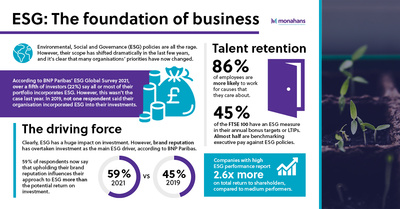28 Mar 2022
ESG: The foundation of business


Environmental, Social and Governance (ESG) policies are all the rage. From climate change to diversity and inclusion (D&I), businesses are facing increasing pressure to tackle the issues on our news agenda.
By and large we’re moving in the right direction. New research has found that nearly half of the UK’s 100 largest companies are benchmarking executive pay against ESG policy and action. As companies increasingly make positive change to the planet and its people, it is expected that these numbers will continue to rise and that ESG will form the foundation of most companies, regardless of size and sector.
However, one criticism that is regularly spoken about around ESG is the presence of ‘washing’, conveying a false impression of doing good for marketing purposes. Unfortunately, there are numerous businesses who have been called out in their attempt to jump on a bandwagon rather than authentically drive change.
So, what key steps do businesses need to take to implement a genuine ESG policy that will strengthen their company and community?
Align your policies with your employees’ values
Your ESG initiatives will be far more believable if they are loved and supported by your employees.
A recent workforce study by PwC found that 86 per cent of employees are more likely to work for commitments that they care about, so ensure you get the opinions of your employees when choosing which ESG policies to support. A survey can be an effective way of gathering this information.
In a time where candidate attraction and retention are incredibly turbulent, it’s down to employers to build a solid foundation of authenticity to help resolve the current hiring crisis. ESG behaviours that interweave with the values of employees will help them feel both happy and proud within their roles.
You can’t please everyone, but…
Of course, in a business of tens, hundreds, maybe thousands, of people, getting everyone to agree on a handful of ESG initiatives may prove nigh-on impossible
Education is key for staff who don’t buy into your choices. If employees refuse to recycle, turn lights off, don’t want to engage with their communities or struggle with the idea of supporting a certain charity, it is your duty to help guide individuals through the change.
Own up to past mistakes and draw a clean slate
For companies that have not yet considered ESG – or who might have been guilty of washing – there’s no use burying your head in the sand. Implementing plans to rectify mistakes and be more proactive will be far better received by stakeholders.
Be prepared to invest
Authentic ESG doesn’t come for free, and businesses will need to ‘put their money where their mouth is’ to be taken seriously. For example, achieving B Corp status will set a company back by £1,200. However, this certification demonstrates a company’s commitment to being accountable and transparent about its ESG work and performance.
It’s no longer acceptable for employers to be concerned about profit and profit alone. With power comes responsibility, and it’s the responsibility of employers to invest in authentic ESG as the backbone of their businesses. Those that do not risk losing valuable clients, staff, and investors.